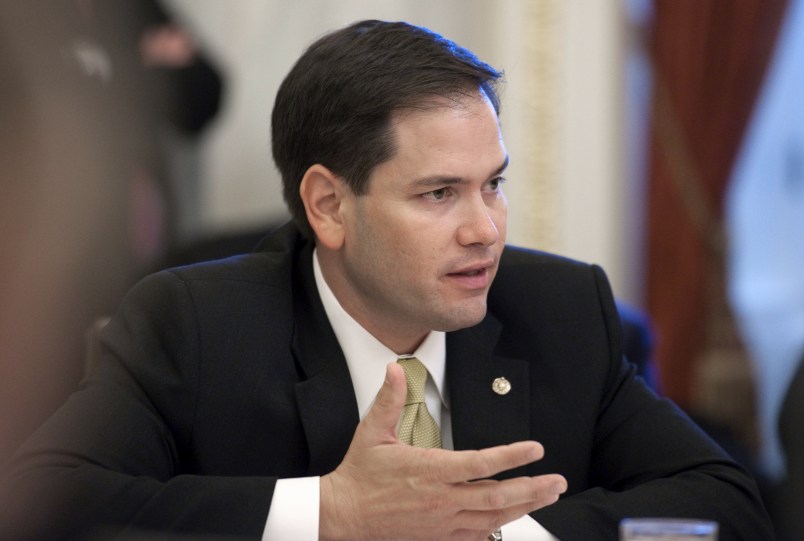As he prepares to release his scaled-back version of the DREAM Act, Sen. Marco Rubio (R-FL) is simultaneously laying the groundwork to blame the White House for its impending failure — and Democrats appear to be falling into his trap. It’s election-year jujitsu for Rubio, who is helping the GOP court Hispanic voters and keeping the door open to the vice presidency.
“One of the things that has already been documented is that the White House has been — the articles that have been written, two or three by now — the White House has been calling in DREAM Act advocates and asking them, almost ordering them, not to work with me on this issue,” Rubio told Laura Ingraham last Thursday on her radio show. “They have been counting on using this issue as a wedge issue in October to drive up turnout.”
Blaming the White House papers over the fact that Republicans have fiercely opposed measures that benefit people living in the country illegally. House Speaker John Boehner has signaled that Rubio’s upcoming proposal won’t change this dynamic. By contrast Democrats voted overwhelmingly in 2010 for the DREAM Act, which unlike Rubio’s alternative includes the promise of citizenship for undocumented people raised in the U.S. who attend college or join the military.
Even so, administration officials and top Democrats may be playing into Rubio’s hands by resisting his effort. Part of the political calculus is that they believe the issue will help energize Hispanic voters for Democrats ahead of the election. Hispanic voters are not happy with President Obama but they prefer him by a huge margin to Republicans, who have repeatedly thwarted efforts to pass comprehensive immigration reform.
Labor Secretary Hilda Solis recently called Rubio’s ideas “half-cooked” and said they don’t go far enough. “His notion of the DREAM Act would only provide you with residency and the ability to stay, go to school but not lead to a path to citizenship,” she told MSNBC.
Senate Majority Leader Harry Reid, in a Sunday interview with the Spanish-language channel Univision, voiced disapproval of a DREAM Act that excludes the promise of citizenship. He didn’t take it off the table, but criticized Rubio for selling his plan differently to different audiences and called on the Republican senator to stop talking about his proposal and release it.
“I’m glad that Marco is doing something. I think that’s significant,” Reid told Univision. “But the problem is, right now there has not been a single word put on paper, not a word. And remember, in anything we do in life, the devil is in the details.”
Los Angeles Mayor Antonio Villaraigosa, who is chairing the Democratic convention this summer, said the plan would create a “second class status” for children of illegal immigrants.
This leaves the White House in a tricky situation. Even though immigrant-rights advocates prefer the actual DREAM Act, they still consider Rubio’s version progress — he says it’ll provide non-immigrant visas to some undocumented people and let them apply for citizenship through the regular channels. If Democrats undermine Rubio’s effort, that makes it easier for the senator to blame them when the proposal goes down, with the aim of confusing voters as to which party is on their side.
“How do you get Hispanics who voted for you in 2008 — who now have higher unemployment, have lost their businesses, have lost their homes, have lost their jobs?” Rubio told Ingraham. “You need an issue like this. So I have no doubt about the fact that [Obama’s re-election campaign] would use this for that.”
The important election-year context is a Republican Party eager to save face with Hispanic voters, after its likely presidential nominee Mitt Romney — who is noncommittal toward Rubio’s effort — took a hardline stance on immigration during the primary by calling for the “self-deportation” of DREAMers and other undocumented immigrants. Analysts say Romney’s path to victory is fairly narrow, and Latino votes could be vital in swing states. The GOP’s top strategic minds believe that warming up to the principles behind the DREAM Act is one way to reach out to them.
“Some of the concepts are clearly attractive,” said Haley Barbour — the former Mississippi governor and RNC chairman who is now advising Karl Rove’s pro-Republican super PAC — of the DREAM Act recently. Urging Republicans to work to win over Latino voters, Barbour said during a CBS appearance that it was unserious of congressional Democrats to bring up the DREAM Act during the 2010 lame-duck session, when Senate Republicans filibustered it.
As Boehner has signaled, DREAMers ought not to expect any action from Congress in the foreseeable future. But the political upshot of Rubio’s effort is to obfuscate a clear and important distinction between the two parties among a key constituency that may potentially swing the outcome of what is expected to be a close election.






